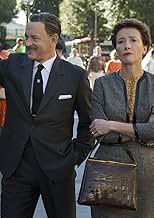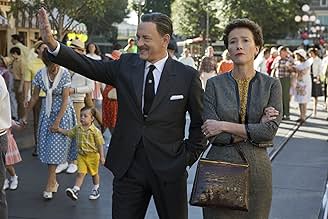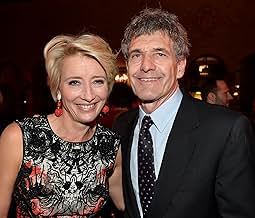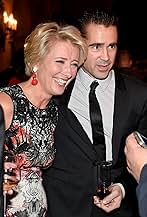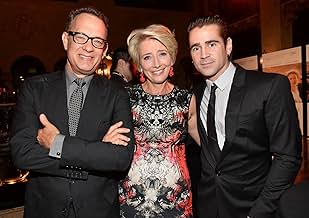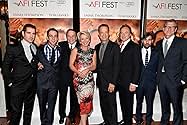La autora P.L. Travers reflexiona sobre su infancia después de reunirse con Walt Disney, quien busca adaptar sus libros de Mary Poppins para la gran pantalla.La autora P.L. Travers reflexiona sobre su infancia después de reunirse con Walt Disney, quien busca adaptar sus libros de Mary Poppins para la gran pantalla.La autora P.L. Travers reflexiona sobre su infancia después de reunirse con Walt Disney, quien busca adaptar sus libros de Mary Poppins para la gran pantalla.
- Dirección
- Guionistas
- Elenco
- Nominado a 1 premio Óscar
- 13 premios ganados y 74 nominaciones en total
Fuschia Sumner
- Flight Attendant
- (as Fuschia Kate Sumner)
- Dirección
- Guionistas
- Todo el elenco y el equipo
- Producción, taquilla y más en IMDbPro
Opiniones destacadas
As with 'The Day of the Jackal', anyone with a basic knowledge of history will know how this ends; just as anyone familiar with the film that eventually emerged from this 1961 meeting of an irresistible force and an immovable object will know both the outcome and who won the creative battles.
We actually learn early on when she laments that "I want to keep my house" that Disney had Travers over a barrel; while the fact that there was never a sequel to 'Mary Poppins' tells us all we need to know about what she reallly thought of the film that emerged.
We actually learn early on when she laments that "I want to keep my house" that Disney had Travers over a barrel; while the fact that there was never a sequel to 'Mary Poppins' tells us all we need to know about what she reallly thought of the film that emerged.
Emma Thompson is great fun to watch, always. Here, she plays Mrs Travers the one who dared to say no to Walt Disney. The movie, made by the Disney studios, would have us believe that Walt Disney was, well...Tom Hanks. No. Impossible, incredible, almost laughable but thanks to the power of the stars one can sit through it, thoroughly entertained by this work of fiction. The imperious character played by Emma Thompson as a theatrical rather than a cinematic experience is nonetheless engaging and moving. The flashbacks were, if you permit the impudence, a total miscalculation. They come back with annoying regularity and instead of adding, they detract from the central story. My favorite parts were the meeting between Mrs Travers and Saint Walt Disney in London and Mrs Travers inviting herself and sitting at the premiere of Mary Poppins.
From the studio that brought you Mary Poppins, Disney has released a biopic about the author of the original novels, P.L Travers. Saving Mr. Banks is the story of her battles with Walt Disney, who wants the rights to the film adaptation, in a dramatic comedy that is both witty and sentimental.
Mrs. Pamela P.L. Travers (Emma Thompson) has been hounded by Walt Disney (Tom Hanks) and the Disney Corporation for 20 years for the film rights to her book and she has refused constantly. But by 1961, she has run out of money and agrees to go to Los Angeles for two weeks to work with the writing team to see if a deal can be struck. Her conditions are that the film cannot be animated, there are no songs and she has final script approval. Travers quickly clashes with creative team and Walt himself, a man who promised his daughters he would adapt the book.
As this is going on Travers reflects on her childhood in rural Australia, with her father (Colin Farrell), a loving man who feeds his daughter's imagination, but an alcoholic with probable depression and how these events influenced her writing.
Saving Mr. Banks is a film armed with excellent screenplay and a top notch cast. As well as the likes of Thompson, Hanks and Farrell, Saving Mr. Banks also features Bradley Whittaker, Jason Schwartzman, Paul Giamatti, B.J. Novak and Ruth Wilson. They all offer strong performances and have given us very well defined characters. Thompson dominates as Travers, a no nonsense woman with poor social skills and a British Bulldog stubbornness/determination and injects a deadpan humour with the witty lines she was given. Thompson also brings out the emotion, the serious aspects of the character, as the shadows of her past still linger over her.
One of the big themes of the film is the writing process, both the individual, personal aspect and the collaborative effect of a film adaptation. Saving Mr. Banks shows that many writers use they personal experience and life and become a part of the author. It is hard for writers to let go and particularly for Travers, as she has so much invested in Mary Poppins, so much of herself in it. Her books allowed her to have some wish fulfilment.
The screenwriters Kelly Marcel and Sue Smith, director John Lee Hancock and editor Mark Livoisi worked brilliant to blending the story of Travers butting heads with Disney's creative team and her backstory about her childhood influencing her writing. There are plenty of transitions, allowing Hancock to have some fancy pans. One particular noticeable sequence is when the creative team performs one of the songs and Travers has a flashback. The film slowly reveals how Travers childhood and her father became a part of her writing, used in the books and become a part of the themes of her books and philosophies. This is particularly the case with her parents and their inabilities to cope, both Travers' father's alcoholism and mother's inability to cope with the stress, leading to her theme of responsibility. For a film that is about the writing process, Saving Mr. Banks never really shows about the writing process that Travers goes through, but explores the writing process of adapting a work, from one medium to another.
The final theme and a big part of the comedy comes from the clashes of cultures and personalities. Travers is a brash personality with formal, conservative approach and lives a modest lifestyle in London and a rustic life in Australia. This in comparison to the overtly friendly American and their glamour and excess, from the fashion to the food, particularly sweet treats and the hard sell from Disney in Travers' hotel room.
Saving Mr. Banks has a excellent screenplay, solid direction and balances the comedy dramatic portions extremely well. The film makes sure there is plenty of sentiment, particularly with the score by Thomas Newman. It is a safe film, but still a pleasing experience. It is perfect if you are a fan of Mary Poppins and you will have the songs stuck in your head.
Please visit www.entertainmentfuse.com
Mrs. Pamela P.L. Travers (Emma Thompson) has been hounded by Walt Disney (Tom Hanks) and the Disney Corporation for 20 years for the film rights to her book and she has refused constantly. But by 1961, she has run out of money and agrees to go to Los Angeles for two weeks to work with the writing team to see if a deal can be struck. Her conditions are that the film cannot be animated, there are no songs and she has final script approval. Travers quickly clashes with creative team and Walt himself, a man who promised his daughters he would adapt the book.
As this is going on Travers reflects on her childhood in rural Australia, with her father (Colin Farrell), a loving man who feeds his daughter's imagination, but an alcoholic with probable depression and how these events influenced her writing.
Saving Mr. Banks is a film armed with excellent screenplay and a top notch cast. As well as the likes of Thompson, Hanks and Farrell, Saving Mr. Banks also features Bradley Whittaker, Jason Schwartzman, Paul Giamatti, B.J. Novak and Ruth Wilson. They all offer strong performances and have given us very well defined characters. Thompson dominates as Travers, a no nonsense woman with poor social skills and a British Bulldog stubbornness/determination and injects a deadpan humour with the witty lines she was given. Thompson also brings out the emotion, the serious aspects of the character, as the shadows of her past still linger over her.
One of the big themes of the film is the writing process, both the individual, personal aspect and the collaborative effect of a film adaptation. Saving Mr. Banks shows that many writers use they personal experience and life and become a part of the author. It is hard for writers to let go and particularly for Travers, as she has so much invested in Mary Poppins, so much of herself in it. Her books allowed her to have some wish fulfilment.
The screenwriters Kelly Marcel and Sue Smith, director John Lee Hancock and editor Mark Livoisi worked brilliant to blending the story of Travers butting heads with Disney's creative team and her backstory about her childhood influencing her writing. There are plenty of transitions, allowing Hancock to have some fancy pans. One particular noticeable sequence is when the creative team performs one of the songs and Travers has a flashback. The film slowly reveals how Travers childhood and her father became a part of her writing, used in the books and become a part of the themes of her books and philosophies. This is particularly the case with her parents and their inabilities to cope, both Travers' father's alcoholism and mother's inability to cope with the stress, leading to her theme of responsibility. For a film that is about the writing process, Saving Mr. Banks never really shows about the writing process that Travers goes through, but explores the writing process of adapting a work, from one medium to another.
The final theme and a big part of the comedy comes from the clashes of cultures and personalities. Travers is a brash personality with formal, conservative approach and lives a modest lifestyle in London and a rustic life in Australia. This in comparison to the overtly friendly American and their glamour and excess, from the fashion to the food, particularly sweet treats and the hard sell from Disney in Travers' hotel room.
Saving Mr. Banks has a excellent screenplay, solid direction and balances the comedy dramatic portions extremely well. The film makes sure there is plenty of sentiment, particularly with the score by Thomas Newman. It is a safe film, but still a pleasing experience. It is perfect if you are a fan of Mary Poppins and you will have the songs stuck in your head.
Please visit www.entertainmentfuse.com
Despite watching the trailer and knowing the broad story, Saving Mr. Banks still managed to surprise me. It's a beautiful, tender film that manages to be sad without being mawkish, funny without detracting from the emotion and with far greater depth than expected. Unfolding the story of Walt Disney's attempt to persuade P.L. Travers to sell him the rights to her beloved Mary Poppins, Saving Mr. Banks is a delightful film that is deceptively emotional and flows smoothly enough to be entirely engaging. Travers (Emma Thompson) thwarts Disney's (Tom Hanks) attempts to secure the rights for twenty years until a flatlining bank balance and a mildly panicking agent persuade her to at least consider Disney's proposition or lose her home with certainty. Whisking her to Hollywood and bombarding her with all things Disney, the master of the House of Mouse spares no expense or effort to woo Mrs Travers and persuade her to allow him to keep his promise to his daughters to film the books they loved so much. But nothing prepares him for the stubborn, exacting curmudgeon who challenges him at every twist and turn and demands and demeans in equal measures. After the recent Captain Phillips, in which Hanks was astounding, there is a very good chance that he may join an exclusive group (of twelve so far, including co-star Emma Thompson) of actors to be nominated for two Oscars in the same year. Even more rarely, he'll deserve both nominations! Quite simply, it is impossible to imagine another actor in the role of Uncle Walt. He oozes charisma and his smile is used for so much more than merely expressing happiness. There is a genuine warmth to Hanks' performance and this is one of those rare occasions where I temporarily forgot I was watching him. He's been a very good actor for many, many years, but this year I've had to reassess my opinion of him and state that he has transcended his deserved 'movie stardom' to become a very fine actor indeed. Unsurprisingly (and most welcome), Hanks is matched every single step of the way by Thompson. There is a magical thawing in her Travers in the course of Saving Mr. Banks where she pokes her head out of her hard, crispy chrysalis and threatens to become a warm(ish), witty woman. Early on in the film, it is difficult to like Travers as her demands become more extreme, her retorts more cutting and her demeanour downright unpleasant, but Kelly Marcel and Sue Smith's screenplay weaves the story of the film rights with the tale of Travers' troubled childhood to give reason for her crustiness and context to her literary creation. It is this aspect of Saving Mr. Banks that surprises most and completes the film. Director John Lee Hancock (The Blind Side) approaches each side of his female protagonist's life very differently and her buried history is shot in muted, dusty colours with a jagged Western romanticism that tempers the bleak happenings that shaped the girl into the woman. Colin Farrell is on his best form for years as Travers Goff, the drunk father who lives in his own fantastic world of imagination and adventure to escape the harsh reality of the real world. He is a man who fails consistently and knows it, but loves his daughter unequivocally. As with Hanks and Thompson, the chemistry between Farrell and Annie Rose Buckley (playing Ginty, the young Travers) is effortlessly beautiful. The casting is just one of the joys of Saving Mr. Banks, with Paul Giamatti chief amongst the supporting actors as Travers' driver, Ralph, a doleful puppy in human form that responds to every brush-off and verbal slap with another smile and encouraging word. In the studio Bradley Whitford as screenwriter Don DaGradi and B.J. Novak and Jason Schwartzman as the Sherman brothers bring more gentle humour as Travers' desperate, unwilling adversaries. There's no lazy leaning towards slapstick or cheap shots, rather Hancock steers their scenes gently allowing both the frostiness and the occasional sprinkles of sunlight to sparkle with sincerity. There are hints of Travers' adult life beyond her books but, though comments remain, it feels as though the backstory was excised for the final cut and so I came away from the film feeling that something was missing. The final act is perhaps a little too tidy; it glides towards a resolution too smoothly and nothing is made of the rumoured aftermath of the deal, but these are minor niggles in a beautiful film that carries one along and moistens the eyes occasionally. Saving Mr. Banks is an unqualified success. It is a joy to watch and leaves one hoping that Mary Poppins earns yet another screening in this year's Christmas TV schedule.
Walt Disney Pictures rarely aims for the Best Picture crown, being more a company focused on profits and sustaining its wildly popular brand. To make you haters hate more: they've earned $4 billion this year already and this includes the $200 million loss of Lone Ranger). They usually only distribute the movies that have a shot at Academy Awards immortality, with The Help (A Dreamworks film) being the latest example of a nominee and No Country For Old Men being their latest example of a winner.
But with Saving Mr. Banks, Disney is going the whole nine yards. With a stellar cast, seemingly endless budget (Giving John Lee Hancock a much-less stressful job in directing), high production value, and heavy dosage of drama that hides beneath the happier movie trailers, this film stands as one of the better dramas of the year and a sure-fire Oscar-contender. Touching upon the tissue-happy themes of forgiveness, family, and seeking happiness in a miserable world, prepare for waterworks throughout the two hours.
What makes this movie work more than anything else is the screenplay that didn't start in the studios of Disney, allowing for a more accurate portrayal of the true story behind the making of the masterpiece Mary Poppins----even if the entire world knows that with the backing of Disney some details will be left out. Kelly Marcel and Sue Smith weaved out an engaging story full of crisp dialogue and skillfully avoids becoming too overblown or too overdramatic. And whenever the movie gets close to being all-out depressing, we get treated to humorous moments here and there to keep the audience in check.
In a movie about artists that are addicted to their craft, you need actors that work with the same type of fervor. Emma Thompson despite not getting top billing gets the most screen time, gets the toughest job, and delivers the ultimate performance. She becomes very dislikable and yet sympathetic at the same time, and it is impossible to see anyone other than Thompson deliver this type of impact. Tom Hanks in an Oscar-baiting year does a superb job portraying the icon planet Earth knows and loves as he gives Walt Disney a humanized performance that separates the flawed man from the myth the Disney Company has feverishly worked to this day to protect. The rest of the cast does not disappoint, and we even see Colin Farrell potentially impress some Academy voters as the loving yet extremely defective father figure.
Disney's protection of its brand is the sole reason why Saving Mr. Banks could never ever ever ever ever ever be produced or made by anybody else. But luckily for all viewers, Disney doesn't pull back many punches in delivering the story behind the complex and conflicted making of Mary Poppins. It will be deep in the Golden Globes and the Academy Awards but ultimately indeed deserves the praise—even if you won't see all the details behind the true story on screen.
But with Saving Mr. Banks, Disney is going the whole nine yards. With a stellar cast, seemingly endless budget (Giving John Lee Hancock a much-less stressful job in directing), high production value, and heavy dosage of drama that hides beneath the happier movie trailers, this film stands as one of the better dramas of the year and a sure-fire Oscar-contender. Touching upon the tissue-happy themes of forgiveness, family, and seeking happiness in a miserable world, prepare for waterworks throughout the two hours.
What makes this movie work more than anything else is the screenplay that didn't start in the studios of Disney, allowing for a more accurate portrayal of the true story behind the making of the masterpiece Mary Poppins----even if the entire world knows that with the backing of Disney some details will be left out. Kelly Marcel and Sue Smith weaved out an engaging story full of crisp dialogue and skillfully avoids becoming too overblown or too overdramatic. And whenever the movie gets close to being all-out depressing, we get treated to humorous moments here and there to keep the audience in check.
In a movie about artists that are addicted to their craft, you need actors that work with the same type of fervor. Emma Thompson despite not getting top billing gets the most screen time, gets the toughest job, and delivers the ultimate performance. She becomes very dislikable and yet sympathetic at the same time, and it is impossible to see anyone other than Thompson deliver this type of impact. Tom Hanks in an Oscar-baiting year does a superb job portraying the icon planet Earth knows and loves as he gives Walt Disney a humanized performance that separates the flawed man from the myth the Disney Company has feverishly worked to this day to protect. The rest of the cast does not disappoint, and we even see Colin Farrell potentially impress some Academy voters as the loving yet extremely defective father figure.
Disney's protection of its brand is the sole reason why Saving Mr. Banks could never ever ever ever ever ever be produced or made by anybody else. But luckily for all viewers, Disney doesn't pull back many punches in delivering the story behind the complex and conflicted making of Mary Poppins. It will be deep in the Golden Globes and the Academy Awards but ultimately indeed deserves the praise—even if you won't see all the details behind the true story on screen.
¿Sabías que…?
- TriviaP.L. Travers never did warm up to the song "Let's Go Fly a Kite" as depicted in this movie. According to Richard M. Sherman, it was "Feed the Birds" that won her over.
- ErroresThe other drivers at the airport hold signs bearing logos of Warner Brothers and MGM adopted sometime after 1961.
- Citas
Walt Disney: George Banks and all he stands for will be saved. Maybe not in life, but in imagination. Because that's what we storytellers do. We restore order with imagination. We instill hope again and again and again.
- Créditos curiososThe credits also have an actual audio recording of P.L. Travers conversing with the filmmakers like the ones depicted in the film.
- Bandas sonorasChim, Chim, Cher-ee
Written by Richard M. Sherman (as Richard Sherman) and Robert B. Sherman (as Robert Sherman)
Performed by Randy Kerber
Selecciones populares
Inicia sesión para calificar y agrega a la lista de videos para obtener recomendaciones personalizadas
- How long is Saving Mr. Banks?Con tecnología de Alexa
- Is "Saving Mr Banks" based on a book?
- Is this the first time that Walt Disney has been portrayed by an actor in a feature film?
- Is it important to watch "Mary Poppins" (1964) before watching "Saving Mr. Banks" (2013)?
Detalles
- Fecha de lanzamiento
- Países de origen
- Sitio oficial
- Idioma
- También se conoce como
- Saving Mr. Banks
- Locaciones de filmación
- Productoras
- Ver más créditos de la compañía en IMDbPro
Taquilla
- Presupuesto
- USD 35,000,000 (estimado)
- Total en EE. UU. y Canadá
- USD 83,301,580
- Fin de semana de estreno en EE. UU. y Canadá
- USD 413,373
- 15 dic 2013
- Total a nivel mundial
- USD 117,867,984
- Tiempo de ejecución2 horas 5 minutos
- Color
- Mezcla de sonido
- Relación de aspecto
- 2.39 : 1
Contribuir a esta página
Sugiere una edición o agrega el contenido que falta







